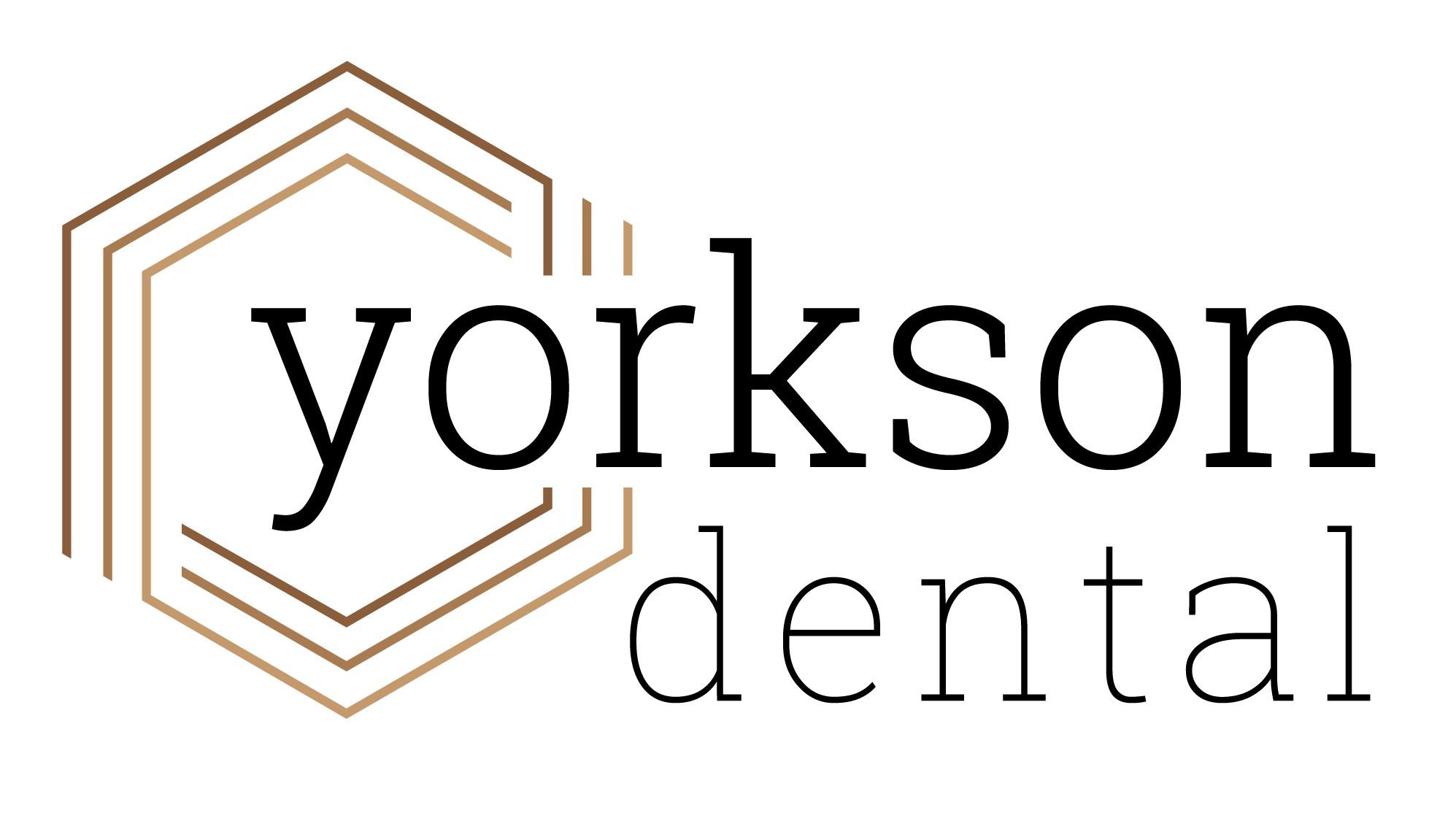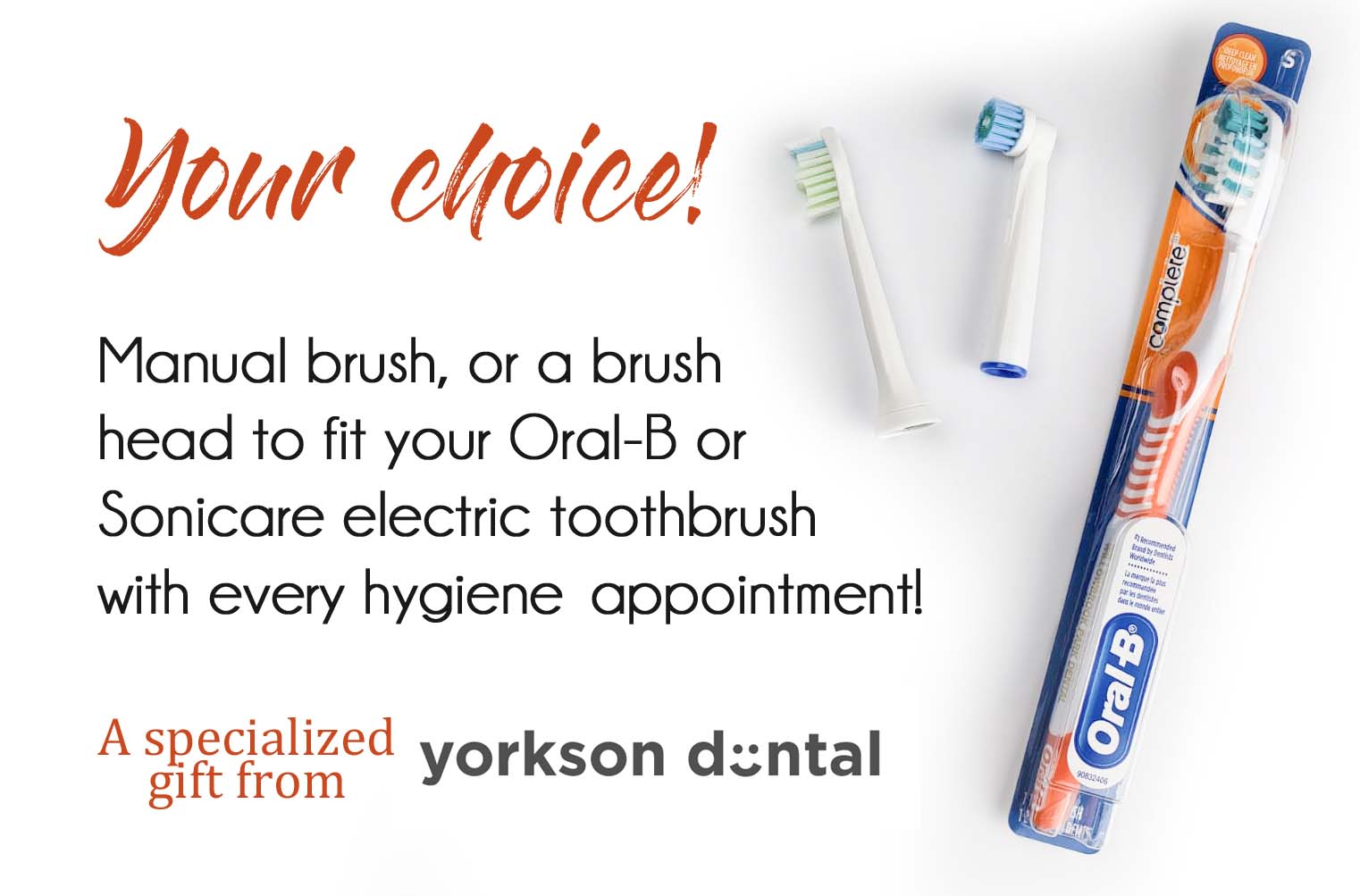
Your Smile, Your Comfort, Your Care
From routine cleanings to more involved treatments, we’re here to make every visit comfortable and personalized. At Yorkson Dental, our approach is centered on your individual needs—because no two smiles are exactly alike.![]()
Explore Our Full Range of Dental Services
Services We Offer
– Click any link below for further information
General Dentistry
General dentistry includes a wide range of preventive, diagnostic, and restorative services designed to support oral health at every stage of life. Regular dental checkups help identify issues like tooth decay, gum disease, or bite imbalances before they lead to more serious concerns. During routine visits, we assess the condition of your teeth, gums, jaw joints, and soft tissues, while providing professional cleanings and oral hygiene guidance tailored to your needs.
Services under general dentistry may include comprehensive oral exams, dental X-rays, fluoride applications, sealants, fillings, and education on effective at-home care. These visits also allow your dental team to monitor changes over time and address emerging issues early.
General dentistry is also where most patients begin their dental care journey, whether it’s scheduling their child’s first appointment or maintaining a long-term care plan. By staying consistent with visits and cleanings, patients can prevent complications, reduce dental costs over time, and enjoy a healthier, more confident smile. From screenings and fillings to gum care and patient education, these services form the core of ongoing oral wellness for individuals and families alike.
Whether you’re new to the area or looking to maintain regular care with a dentist in Langley, general dentistry is the first step in achieving and preserving a healthy smile
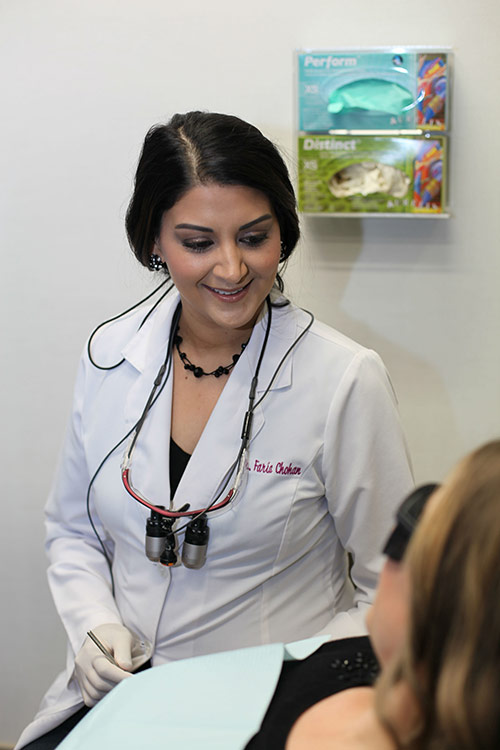
Emergency Dentistry
Dental emergencies can happen without warning and often require immediate attention to relieve pain or prevent further damage. Common dental emergencies include toothaches, broken or chipped teeth, knocked-out teeth, swelling, and lost fillings or crowns. Prompt care in these situations can help save a tooth, manage infection, and reduce long-term complications.
When a dental emergency arises, it’s important to contact our office as soon as possible. We do our best to accommodate urgent cases with same-day or next-available appointments. In the meantime, we can offer advice over the phone to help manage your symptoms safely until you arrive.
Whether you’ve suffered an injury, are experiencing sudden pain, or have noticed a concerning change in your mouth, we’re here to support you with timely, compassionate care. If you’re looking for emergency dental services in Langley, our team is equipped to assess the issue and provide appropriate treatment as quickly as possible.

Comprehensive Oral Exam & New Patient Exam
A comprehensive oral exam is a complete evaluation of your oral health. It typically includes a review of your medical and dental history, a visual examination of your teeth, gums, and soft tissues, and digital X-rays when needed. We assess your bite, check for signs of decay or gum disease, and screen for oral cancer as part of this thorough process.
For new patients, this exam also includes a one-on-one discussion about your dental goals, concerns, and any past treatment experiences. It’s a valuable opportunity to establish a baseline for your care and ensure that future treatment recommendations are personalized and informed.
These exams are essential for prevention, early detection, and long-term treatment planning. They help your dental team identify issues before symptoms appear and guide you in maintaining your oral health over time.
Fillings
Dental fillings are used to restore teeth that have been damaged by cavities or minor fractures. The decayed or compromised portion of the tooth is removed, and a filling material is used to rebuild the shape and function of the tooth.
There are several types of filling materials available, including composite resin, amalgam, and glass ionomer. The best option depends on the location of the tooth, the size of the cavity, and your individual needs. Fillings help prevent further decay, protect the tooth structure, and restore your ability to chew comfortably.
Composite Fillings
Composite fillings are a tooth-coloured solution used to restore teeth affected by decay, chips, or wear. The resin material is carefully applied in layers, then hardened with a curing light to match the surrounding enamel. Because of their natural appearance, composite fillings are often chosen for front teeth or visible areas of the smile.
These fillings are durable and bond directly to the tooth structure, helping to reinforce the remaining enamel. They can also be used to replace older silver amalgam fillings for a more aesthetic result. Placement is typically completed in a single visit, making them a convenient and effective solution for minor to moderate dental restorations.
Mercury-Free Fillings
Mercury-free fillings, typically made from composite resin, offer a tooth-coloured alternative to traditional silver amalgam fillings. These materials are often preferred for their aesthetic appearance, especially when restoring teeth in visible areas of the mouth.
Composite fillings bond directly to the tooth structure, which allows for a more conservative preparation and can help reinforce the remaining enamel. Mercury-free options are suitable for small to medium cavities and can also be used to replace old amalgam fillings.
Patients who have personal or health-related preferences for avoiding amalgam materials may choose this option as part of their overall treatment plan.
Hygiene
Dental hygiene appointments are a key part of preventive oral care. During these visits, a dental hygienist performs scaling to remove plaque and tartar buildup, followed by polishing to smooth the tooth surfaces and reduce future buildup. Fluoride may also be applied to help strengthen enamel.
These appointments provide an opportunity to check for signs of gum disease, tooth decay, and other oral health concerns that may not be visible or symptomatic at home. Your hygienist will also review your brushing and flossing techniques and offer tips for improving at-home care.
Professional cleanings are typically recommended every six months, although patients with periodontal concerns may benefit from more frequent visits. Maintaining regular hygiene care supports long-term oral health and can help reduce the risk of more complex dental problems later on.
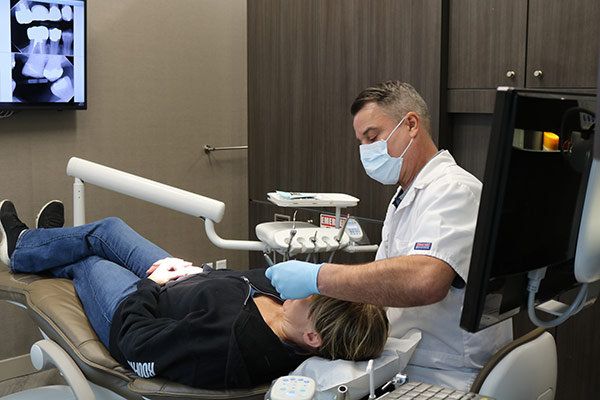
Sealants
Dental sealants are thin, protective coatings that are applied to the chewing surfaces of molars and premolars. These areas are particularly vulnerable to decay due to their deep grooves and pits, which can trap food and bacteria. Sealants help create a smoother surface that is easier to clean, reducing the risk of cavities.
Sealants are most commonly applied during childhood when permanent molars first emerge, but they can also benefit adults who are at higher risk of tooth decay. The process is quick, painless, and completed in a single visit—no drilling or numbing required.
With regular dental checkups, sealants can last several years before reapplication is needed. They are an affordable and effective way to add an extra layer of protection to your preventive care routine.
Oral Cancer Screening
Oral cancer screening is a routine part of comprehensive dental exams. The goal is to identify any abnormal tissue changes in the mouth, throat, lips, or neck at an early stage. Your dentist will visually inspect the soft tissues and gently palpate the area to detect any lumps, lesions, or unusual textures.
In some cases, additional tools such as light-based devices may be used to assist in detection. Early identification of suspicious areas allows for timely referral and testing, which can significantly improve treatment outcomes.
Screenings are particularly important for patients who use tobacco, consume alcohol frequently, or have a history of oral cancer. However, we perform this evaluation for all adult patients as part of regular preventive care.

Pediatric Dentistry
Pediatric dentistry focuses on providing oral care tailored to infants, children, and adolescents. Early dental visits are important for building positive experiences and establishing healthy oral habits from a young age. Services include exams, cleanings, fluoride treatments, sealants, and monitoring of oral development.
We also provide guidance on thumb-sucking, teething discomfort, nutrition, and home care routines. Regular visits help ensure that any emerging issues—such as tooth decay or alignment concerns—are addressed early.
Creating a calm and welcoming environment is key to helping children feel comfortable in the dental setting. Our goal is to support long-term oral health and set the foundation for confident smiles into adulthood.
Teeth Whitening
Professional teeth whitening helps remove surface stains caused by coffee, tea, red wine, tobacco, or the natural aging process. We offer both in-office and take-home options to suit your preferences and timeline. Whitening treatments are most effective on natural enamel and work best following a dental cleaning.
Before treatment, we evaluate your oral health to ensure whitening is safe and appropriate. Your dentist can also provide guidance on managing sensitivity and maintaining results after the procedure. Patients often choose whitening before important events or as part of a cosmetic makeover plan.
Zoom! Whitening
Zoom! Whitening is an in-office procedure designed to deliver noticeable whitening results in a single visit. The treatment involves applying a professional-grade whitening gel to your teeth and activating it with a specialized LED light. The process is completed in several 15-minute sessions over the course of approximately one hour.
This treatment is popular for its speed and convenience. Patients typically notice their teeth appear several shades whiter immediately after the appointment. Your dentist will assess your oral health beforehand and discuss how to maintain the results with good habits and optional touch-up kits.
Take Home Whitening
Take-home whitening kits provide a convenient and gradual way to enhance your smile from the comfort of home. After a short appointment to take digital impressions or molds of your teeth, we create custom-fitted trays that hold a professional-strength whitening gel. You’ll be given instructions on how long to wear the trays each day and how many days the treatment typically takes, depending on your goals and starting shade.
Unlike store-bought kits, custom trays ensure even whitening and minimize the risk of irritation to the gums. Take-home whitening is often a good choice for patients with sensitive teeth or those who prefer a more controlled approach to whitening. With consistent use over 1–2 weeks, many patients see a noticeable improvement in the brightness of their smile.
Pola Whitening
Pola Whitening is a flexible whitening system that includes both in-office and take-home options. It uses a hydrogen peroxide or carbamide peroxide gel available in different strengths to accommodate varying levels of sensitivity and staining.
The in-office treatment is designed for quick, noticeable results, while the take-home version allows for a more gradual approach. The formula is designed to minimize dehydration and sensitivity, making it a comfortable choice for many patients. Your dentist will help determine the ideal option based on your whitening goals and lifestyle.
Root Canals
A root canal is a treatment used to preserve a tooth that has become infected or inflamed in the pulp—the soft tissue inside the root canals. Infection may result from deep decay, a cracked tooth, or trauma. Left untreated, it can lead to pain, swelling, or even abscess formation.
During the procedure, the infected tissue is removed, and the canals are cleaned, disinfected, and filled with a biocompatible material. A crown is typically placed afterward to restore the tooth’s structure and function. Root canal therapy helps save natural teeth and prevents the need for extraction.
We use digital imaging and proven techniques to support comfort, efficiency, and accuracy throughout the procedure. Many patients report that a root canal feels similar to receiving a standard filling.

Tooth Extractions
Tooth extraction may be recommended when a tooth is too damaged to be restored, or when its removal supports overall oral health. Common reasons for extraction include extensive decay, severe infection, advanced gum disease, orthodontic planning, or impacted teeth.
The procedure begins with digital imaging to evaluate the tooth’s roots and surrounding structures. Local anesthesia is used to numb the area, and the tooth is gently removed. Aftercare instructions are provided to support healing, and your dentist will discuss whether a tooth replacement—such as a dental implant or bridge—may be appropriate.
Simple extractions are often quick and straightforward, while surgical extractions may be needed for teeth that are broken below the gum line or impacted.
Wisdom Teeth Extraction
Wisdom teeth are the third molars that typically erupt between the ages of 17 and 25. In many cases, there isn’t enough room in the mouth for them to emerge properly, leading to impaction, crowding, or alignment issues. Removal may be recommended to prevent complications like infection, pain, or damage to adjacent teeth.
The process begins with a clinical exam and digital X-rays or CBCT imaging to evaluate the position of the teeth. Depending on the complexity of the case, wisdom teeth can be removed in a single appointment with local anesthesia or a form of sedation. Recovery times vary, and most patients return to normal routines within a few days.
Early removal of wisdom teeth, often in the late teens or early twenties, can help reduce the risk of complications and make recovery easier.
Restorative Dentistry
Restorative dentistry focuses on repairing or replacing teeth that have been damaged by decay, injury, or disease. These treatments are designed to restore the structure, function, and comfort of your teeth while helping you maintain long-term oral health. Whether you’re dealing with a single cavity or multiple missing teeth, restorative options can be tailored to your needs.
Common services include fillings, crowns, bridges, dentures, inlays and onlays, and dental implants. In addition to restoring oral function, these treatments can improve your ability to chew, speak, and smile with confidence. Restorative dentistry also plays a role in preventing further dental issues by reinforcing the integrity of your remaining teeth.
We assess your oral condition carefully to develop a plan that considers both your current needs and long-term goals. Your dentist will explain the available options, materials, and steps involved so you can make informed choices about your care.
All-on-X Dental Implants
All-on-X dental implants are a full-arch tooth replacement option designed for patients who have lost most or all of their teeth in one arch. This system uses either four or six strategically placed implants to support a custom denture that is fixed in place, offering improved stability compared to traditional removable dentures.
All-on-X may be recommended for patients who want a long-term, fixed solution without needing an individual implant for each missing tooth. After thorough planning using digital imaging, implants are placed and, in some cases, a temporary restoration is attached on the same day. A permanent denture is fabricated once healing is complete.
This treatment helps restore chewing function, facial structure, and confidence, and may reduce the need for bone grafting in many cases.
Bridges
A dental bridge is a fixed prosthetic used to replace one or more missing teeth. It typically consists of an artificial tooth (or teeth) anchored by crowns placed on the natural teeth or dental implants on either side of the gap.
Bridges help restore bite alignment, prevent adjacent teeth from shifting, and improve chewing and speaking ability. They are often made from materials like porcelain fused to metal, ceramic, or zirconia, selected for durability and aesthetics.
With proper care, a bridge can provide reliable function and support for many years. Your dentist will guide you through hygiene practices to maintain your restoration and the supporting teeth.
Dentures
Dentures are removable appliances used to replace missing teeth and restore oral function. Full dentures replace all teeth in the upper or lower arch, while partial dentures fill in gaps when some natural teeth remain. Our dentures are designed for comfort, fit, and natural appearance.
We work closely with patients to ensure proper fit and support, using impressions and digital measurements to fabricate a custom prosthesis. Dentures help improve chewing ability, restore facial contours, and support speech.
Regular checkups are important for adjusting the fit of your dentures and monitoring oral tissues. Over time, changes in the gums and jawbone may require relining or replacement.
Dental Implants
Dental implants are a long-lasting solution for replacing missing teeth. They consist of a titanium post that is surgically placed into the jawbone and a custom restoration—such as a crown, bridge, or denture—that is secured to the implant.
Implants offer a natural look and feel, and they help preserve bone density by stimulating the jaw where teeth are missing. They do not rely on neighboring teeth for support and are designed to blend in with your existing smile.
Treatment involves a planning phase with digital imaging, the implant placement, healing time, and final restoration. Implants can be used to replace single teeth or to support full-arch restorations like All-on-4.
Periodontal Services
Periodontal care addresses the health of the gums and supporting structures of the teeth. Gum disease, or periodontal disease, ranges from mild gingivitis to more advanced periodontitis, which can lead to tooth loss if untreated.
We provide services such as scaling and root planing (deep cleaning), ongoing maintenance cleanings, and monitoring of pocket depths to manage and stabilize gum health. Education on brushing, flossing, and lifestyle habits is also part of comprehensive periodontal care.
Early detection and consistent care are key to preventing progression and preserving the integrity of your smile.
Gum Contouring
Gum contouring reshapes the gumline for functional or cosmetic reasons. This procedure may be recommended to reduce excess gum tissue (a “gummy” smile) or to even out the appearance of the gumline. It can also be part of treatment for periodontal concerns where irregular tissue affects cleaning or comfort.
A soft tissue laser or scalpel is used to gently sculpt the gums, often with minimal discomfort and a short recovery period. Results can help improve both the aesthetics and hygiene of the area.
Cosmetic Dentistry
Cosmetic dentistry focuses on enhancing the appearance of your teeth, gums, and overall smile. It includes a range of services designed to improve colour, alignment, shape, spacing, and symmetry. These treatments are often chosen by patients who want to feel more confident in their smile or are preparing for special events.
We work with you to understand your aesthetic goals and provide personalized recommendations. From minor corrections to complete smile transformations, cosmetic dentistry offers both subtle and dramatic improvements that align with your lifestyle and vision.
Crowns
Dental crowns are custom-fabricated caps that fully cover a damaged or weakened tooth to restore its shape, function, and appearance. They are commonly used after root canal therapy, to protect large fillings, or to restore cracked or worn teeth. Crowns are also used in combination with implants and bridges.
Materials include porcelain, ceramic, metal alloys, or a combination, selected based on the tooth’s location and your aesthetic preferences. Crowns are designed to blend with your natural teeth while offering long-lasting support. The process usually takes two visits—one to prepare the tooth and take impressions, and another to place the final crown. In some cases, same-day digital crowns can be completed using in-office technology, allowing for faster turnaround and fewer appointments.
Inlays and Onlays
Inlays and onlays are custom restorations used when a tooth requires more support than a filling can provide but doesn’t need a full crown. Inlays fit within the grooves of the tooth, while onlays extend to cover one or more cusps. They are often made of porcelain, composite resin, or gold.
These restorations are fabricated in a dental lab based on a precise impression or digital scan. They offer a durable and aesthetic solution for preserving natural tooth structure while restoring strength and function.
White Fillings
White fillings, also called composite fillings, are used to repair cavities or minor tooth damage while maintaining a natural appearance. They are colour-matched to your existing tooth enamel, making them ideal for visible areas of the mouth.
White fillings are placed in layers, cured with a special light, and polished to blend seamlessly with surrounding teeth. In addition to restoring strength and shape, they help prevent further decay and can be used to replace older metal fillings.
Dental Bonding
Dental bonding is a minimally invasive procedure used to repair small chips, cracks, discolouration, or gaps in the teeth. A tooth-coloured resin is applied, shaped, and hardened with a special light, then polished for a natural finish. This treatment is typically completed in a single visit.
Bonding is a cost-effective way to enhance your smile and is often recommended for minor cosmetic improvements. Bonding is a cost-effective way to enhance your smile and is often recommended for minor cosmetic improvements.
Veneers
Veneers are thin shells, typically made of porcelain, that are bonded to the front surfaces of teeth to enhance their shape, size, and colour. They are often used to address cosmetic concerns such as uneven edges, discolouration, small gaps, and worn or misshapen teeth.
Each veneer is custom-designed to complement your facial features and overall smile aesthetics. The process usually involves preparing the tooth, taking impressions, and bonding the final veneer at a follow-up visit. Veneers are stain-resistant and can offer a long-lasting improvement with proper care.
Botox
In dentistry, Botox may be used as a therapeutic option for patients experiencing jaw tension, clenching, or symptoms of temporomandibular joint (TMJ) disorders. When injected into targeted facial muscles, it can help relieve discomfort by reducing muscle activity.
Some patients also explore Botox to smooth fine lines around the mouth or enhance overall facial aesthetics. The procedure is quick, and results typically last several months. Botox can be integrated into a treatment plan based on your functional and cosmetic goals.
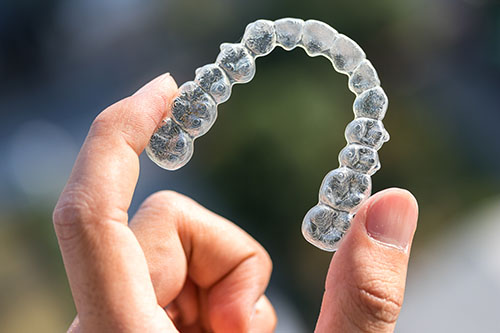
Invisalign
Invisalign is a clear aligner system used to gradually straighten teeth without the need for metal braces. Custom-molded trays are worn over the teeth and replaced every 1–2 weeks to gently shift them into alignment. Invisalign can correct crowding, spacing, overbites, underbites, and other orthodontic issues.
The aligners are removable for eating, brushing, and flossing, making them convenient for daily life. Treatment time varies by case, and progress is monitored through regular dental visits. Invisalign is a popular choice for both teens and adults seeking discreet orthodontic care.
Sedation Dentistry
Sedation dentistry is used to help patients feel more at ease during dental procedures, especially if they experience anxiety, have a sensitive gag reflex, or require lengthy or complex treatment. Several types of sedation are available, ranging from mild to moderate, and your dentist will help determine the most appropriate option based on your comfort level and the procedure involved.
Sedation can be used for everything from routine cleanings to oral surgery. Patients typically remain awake but deeply relaxed, and many remember little about the appointment afterward. All sedation options are delivered under close monitoring to ensure safety and comfort throughout the visit.
IV Sedation
IV (intravenous) sedation provides a deeper level of relaxation and is often used for more complex procedures or for patients with significant dental anxiety. Medication is delivered directly into the bloodstream, allowing it to take effect quickly and be adjusted as needed during the procedure.
While under IV sedation, patients remain conscious but often feel drowsy and may not recall the procedure. A responsible adult is required to accompany the patient to and from the appointment. IV sedation is administered by trained professionals using appropriate monitoring equipment.
Oral Sedation
Oral sedation involves taking a prescribed medication by mouth before your appointment to promote calmness and relaxation. The effects can range from light drowsiness to moderate sedation, depending on the dosage and your individual response.
Patients using oral sedation will need someone to drive them to and from the dental office and should plan to rest for the remainder of the day. This option is commonly used for patients with mild to moderate dental anxiety or those undergoing multiple procedures.
Nitrous Sedation
Nitrous oxide, often called laughing gas, is a mild sedative inhaled through a small nosepiece during treatment. It helps reduce anxiety and create a sense of calm without putting the patient fully to sleep. The effects wear off quickly after the gas is stopped, allowing most patients to return to their day as usual.
This option is ideal for children or adults with mild anxiety or sensitivity to dental procedures. It is safe, effective, and easily adjusted throughout the appointment for your comfort.
Oral Surgery
Oral surgery includes a range of procedures involving the teeth, gums, jaw, and surrounding tissues. Common types include tooth extractions, wisdom teeth removal, implant placement, and treatment for cysts or infections.
Each procedure begins with a thorough consultation, including imaging and a review of your medical history. We discuss your treatment options, anesthesia or sedation choices, and post-operative care instructions to help ensure a smooth recovery.
While some oral surgery procedures are completed in a general dental setting, others may require coordination with a dental specialist such as an oral surgeon. Our team will guide you through each step and help you feel confident in your care.
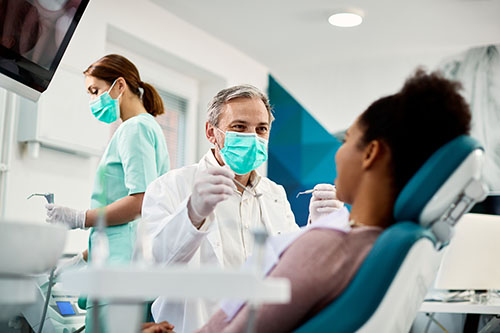
Dental Technology
Dental technology supports more precise diagnostics, efficient treatment planning, and an improved overall experience for patients. At Yorkson Dental, we incorporate a range of tools and systems to help detect problems earlier, plan treatments with greater accuracy, and provide clearer communication about your oral health.
Our technology includes 3D imaging, digital scanning, and in-office milling systems that support restorative, orthodontic, and surgical care. These tools help streamline procedures, reduce treatment time, and support predictable results tailored to each patient’s unique needs.
Digital X-Rays
Digital X-rays provide high-resolution images with significantly less radiation exposure than traditional film. They are instantly available for review, making it easier to detect issues such as decay, infections, bone loss, and impacted teeth. Images can be enlarged for better visualization and shared electronically with specialists if needed.
Intraoral Camera
An intraoral camera is a handheld device that captures detailed images inside your mouth. These real-time visuals are displayed on a monitor, helping patients better understand their oral health. Intraoral cameras are particularly useful for documenting problem areas, monitoring progress, and enhancing patient communication.
VELscope Exams
VELscope is a fluorescence-based oral screening device that helps detect abnormal tissue not visible under standard lighting. It is used to support early detection of oral cancer or precancerous changes during routine exams. The scan is quick, non-invasive, and performed in conjunction with a traditional visual and tactile exam.
iTero Digital Scanner
The iTero scanner replaces traditional dental impressions with a fast, accurate 3D digital scan. It is commonly used for Invisalign planning, crowns, bridges, and other restorative work. Digital scans are more comfortable for patients and provide precise visuals for designing custom treatments.
CEREC
CEREC technology allows for same-day dental restorations such as crowns, inlays, or onlays. Using a digital scan, we design and mill your custom restoration in the office, eliminating the need for temporary restorations and return visits. CEREC restorations are crafted from durable ceramic materials and are colour-matched to your natural teeth.
CBCT Scanner
CBCT (Cone Beam Computed Tomography) provides 3D imaging of teeth, bone, nerves, and soft tissues. It is especially valuable for planning dental implants, root canal therapy, and oral surgery. The detailed images help ensure accurate placement and minimize risk by allowing for precise treatment planning.
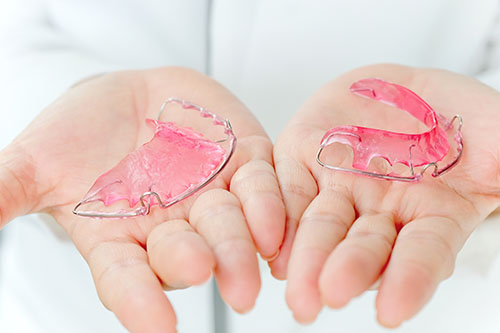
Guards and Appliances
Custom dental appliances are used to protect teeth, improve jaw alignment, or address sleep-related conditions. These include guards for bruxism, sports mouth guards, retainers, and oral sleep appliances. Each is custom-fitted for comfort and designed to meet specific treatment needs.
Night Guards
Night guards are worn while sleeping to protect teeth from grinding or clenching (bruxism). They reduce the risk of tooth wear, fractures, and jaw discomfort. Custom-made night guards provide a better fit and durability than store-bought versions.
Sports Mouth Guards
Sports mouth guards help prevent dental injuries during physical activity. Custom-fit guards provide better comfort and protection than generic options and are recommended for both children and adults involved in contact or high-impact sports.
TMJ/TMD Treatment
TMJ (temporomandibular joint) disorders can cause symptoms such as jaw pain, headaches, and difficulty chewing. Treatment may include custom splints, night guards, jaw exercises, or coordination with specialists. Early diagnosis can help prevent long-term complications and support better function and comfort. In some cases, Botox may be used as part of TMJ treatment to help relax tense jaw muscles and relieve discomfort.
Retainers
Retainers are used to maintain tooth alignment after orthodontic treatment. Options include removable clear retainers or fixed (bonded) retainers depending on your case. Consistent use as directed helps preserve the results of braces or Invisalign.
Snoring / Sleep Apnea Solutions
Oral appliances can help manage snoring and mild to moderate obstructive sleep apnea by repositioning the jaw or tongue to keep the airway open during sleep. These devices are custom-fitted and may be a suitable alternative for patients who cannot tolerate CPAP therapy. A sleep study and diagnosis are required before treatment.
Specialties
Some dental needs require specialized care. We offer select specialty services in-house and collaborate with specialists when more advanced treatment is required. This ensures continuity of care for complex or multidisciplinary cases.
Endodontics
Endodontics focuses on diagnosing and treating issues involving the tooth pulp and surrounding tissues. This includes root canal therapy, retreatment of previous root canals, and treatment of dental trauma. Endodontic care helps preserve natural teeth and alleviate pain from infection or inflammation.
Orthodontics
Orthodontic care corrects misaligned teeth and jaws to improve function, appearance, and long-term oral health. Treatment options may include traditional braces, Invisalign, retainers, and early interceptive appliances. Orthodontics can improve bite alignment, reduce wear, and enhance overall confidence in your smile.
REQUEST YOUR APPOINTMENT
![]()
Come and see what we’re about. We’ve got the friendliest dental staff.
